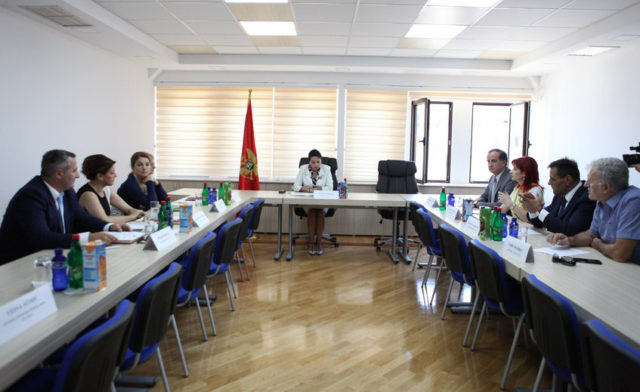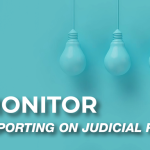29/3/2019 HRA STATEMENT REGARDING THE ATTACK ON TOMKIĆ FAMILY
03/04/2019
19/6/2019 APPOINTMENT OF COURT PRESIDENTS AND APPLICATION OF THE CONSTITUTION AND THE LAW ON THE JUDICIAL COUNCIL AND JUDGES OF MONTENEGRO
24/06/201931/5/2019 Appeal sent by 11 Montenegrin NGOs to the Judicial Council of Montenegro

Human Rights Action is one of the signatories of the letter sent to the President of the Judicial Council of Montenegro, Mr. Mladen Vukčević, by eleven non-governmental organizations regarding the decision on candidates for election to the office of the President of the Supreme Court and the candidate for election to the office of the president of the Basic Courts in Podgorica, Bar, Blue, Rožaje and Kotor.
The letter in its entirety:
JUDICIAL COUNCIL OF MONTENEGRO
Mr. Mladen Vukčević, President
CC: Judicial Council Members
Podgorica, 31 May 2019
Subject: Decisions on Applications for the Presidents of the Supreme Court and the Podgorica, Bar, Plav, Rožaje and Kotor Basic Courts
Dear Mr. Vukčević,
Incumbent Supreme Court President Mrs. Vesna Medenica is the only one who applied for the advertised Montenegrin Supreme Court President vacancy[1], while the candidates who applied for the offices of Presidents of the Basic Courts in Bar, Podgorica, Kotor, Rožaje and Plav[2] include, among others, the incumbent Presidents of these Courts, notably Mr. Goran Šćepanović, Mr. Zoran Radović, Mr. Branko Vučković, Mr. Zahit Camić and Mr. Hilmija Sujković. All of them were elected Presidents of the Courts they are now heading on at least two occasions; Messrs Camić and Vučković have been Presidents of these Courts for as many as five and seven terms respectively.
Under the amendment to Article 124 of the Constitution of Montenegro, which came into effect on 31 July 2013, “[T]he same person may be elected the president of the Supreme Court no more than two times.”[3] Pursuant to the amendments to the Montenegrin Act on the Judicial Council and Judges, which entered into force on 1 January 2016, “[N]o-one may be elected president of the same court more than twice.” (Article 42(1)).
On 30 May 2019, the Judicial Council concluded that the applications by the incumbent Basic Court Presidents, who have already been elected to these offices two or more times, were valid and that the application of the above-mentioned provision to them would amount to retroactive application of the law, which is prohibited under the Constitution (Art. 147). It would thus come as no surprise if the Judicial Council applied the same interpretation also to the candidacy of the incumbent Supreme Court President, who has already been elected to that office twice.
We oppose such an interpretation of the Montenegrin Constitution and the Act on the Judicial Council and Judges. There is no call for invoking the rule on the prohibition of retroactivity because there is no retroactive effect of the law in this case. The Constitutional Court of Montenegro has held that “a provision of a law has retroactive effect when it concerns rights and legal relations that had been created and ended earlier, before that law entered into effect.”[4] The 2013 amendments to the Constitution and the new Act on the Judicial Council and Judges, adopted in 2016, do not apply to rights and legal relations created before they had been adopted.
To recall, Mrs. Medenica was first elected Montenegrin Supreme Court President on 19 December 2007. Her first term in office lasted over six and a half years,[5] until she was re-elected on 26 July 2014. The vacancy we are writing to you about was advertised because her second, five-year term in office is soon expiring.
Mrs. Medenica’s third election to the office of Supreme Court President would amount to a grave violation of Article 124(5) of the Montenegrin Constitution. The constitution-maker had adopted this provision, explicitly prohibiting one and the same person from being elected Supreme Court President more than twice, while she was serving her first term in office as President of that Court.
Pursuant to Article 124(5) of the Constitution: “[T]he same person may be elected the president of the Supreme Court no more than two times.” This provision cannot be interpreted as allowing the appointment of any individual, including Mrs. Medenica, to this office the third time. Specifically, Mrs. Medenica has already been elected Montenegrin Supreme Court President twice. The fact that she was elected to it twice (in 2007 and 2014) by two different bodies, the first time by the Montenegrin Assembly and the second time by the Judicial Council, is of absolutely no relevance to the application of this constitutional provision. What is of relevance to the Constitution is the fact that the same person has already been elected Supreme Court President twice. If that were not the case, the constitution-maker could have qualified the election by considering as relevant only the election by e.g. the Judicial Council (for instance, by specifying that “[T]he Judicial Council may not elect the same person Supreme Court President more than twice.”) or by considering as relevant only the election after a specific date, e.g. 2013. But the constitution-maker did not do that and thus narrowed the scope for any manipulation allowing any individual, who has already twice been elected Montenegrin Supreme Court President, to hold such an important office for the third time.
Furthermore, and just as important, no analogy can be drawn between this case and the impugned third term in office of the first President of the State of Montenegro, Filip Vujanović, under the relevant constitutional provision, “[T]he same person may be elected the President of Montenegro maximum two times.” The Constitutional Court ruled that he had not served his first term as President of independent Montenegro, but as President of another entity, the Republic of Montenegro, which was part of the State Union of Serbia and Montenegro at the time.[6] On the other hand, Mrs. Medenica was elected both times in the same state of Montenegro and she was elected President of the one and the same Supreme Court of Montenegro, which has not changed whatsoever in the meantime.
Given the meaning and objective of the new rule, its interpretation as an “eraser” of all the elections to the office of court president before it entered into force is unjustified. Retroactive effect of the Constitution or the law is not at issue here, because the rule applies to elections after 2013 and 2016, i.e. the future, and concerns the criteria for exercising a responsible public office in general interest, not the realisation of an acquired or human right. Court presidents are elected under rules and regulations applicable during the election process.[7] In this specific case, the election rules and regulations had been laid down a long time before the election process was initiated, six and four years ago respectively.
If the prior terms in office are not factored in during this election process as an eligibility requirement, then the other election requirements fulfilled before the amendment of the Constitution and the adoption of the Act on the Judicial Council and Judges, including years of service, cannot be factored in either. The candidates would be ineligible for election. Otherwise, the Judicial Council would demonstrate that it took into account only the requirements the candidates had fulfilled earlier and the facts to their advantage, but neglected others under the excuse that they amounted to retroactive application of the law.
The prohibition of retroactivity protects acquired rights, i.e. human rights and freedoms. In that sense, application of the constitutional limitation prohibiting anyone from being elected Supreme Court President more than twice does not prejudice any acquired or human rights either of Mrs. Medenica or the other above-mentioned candidates for the offices of court president. The Venice Commission has already explained that the individual interest of public officials to be re-elected is not a human right.[8] The Montenegrin Constitutional Court also ruled that “the right to stability of employment in terms of Article 6 of the Convention [ILO] cannot, by its nature, be considered an individual (human) right, which would in and of itself have the quality of an acquired right that belongs to an individual and which would inherently also be protected in periods of change of legal regimes.”[9] The case-law of the Constitutional Court of the Republic of Slovenia is also relevant in this context. That Court said that “narrowing or abolishing already acquired rights does not amount to retroactive effect of the law when the introduced measure applies to the period after it enters into force”, while “only diminishing or revoking a right for the period preceding the entry into force of the law amounts to genuine retroactivity.”[10] It needs to be noted here that the terms in office of and rights realised by Mrs. Medenica and other Court Presidents elected two or more times before the Constitution and the law were amended are not prejudiced; nor are their rights acquired under prior regulations in any way diminished or revoked. Therefore, it is absurd to talk about the retroactive application of regulations.
As far as the purpose (ratio legis) of the provision prohibiting anyone from being elected president of the same court more than twice is concerned, one should bear in mind that the rule preventing the same individuals from performing the same public offices for years is a major cornerstone of democracy. In the view of the Venice Commission, limiting the terms of presidents of states “can promote accountability of elected officials by helping to prevent inappropriate concentrations of power”.[11] It has held that “abolishing limits on presidential re-election represents a step back in terms of democratic achievement.”[12] Therefore, this rule is a democratic step forward in general interest while, as noted above, the state officials’ right to re-election is not an absolutely protected human right. Furthermore, allowing Mrs. Medenica and other incumbent court presidents to be elected for the third time would amount to their obviously illegal gratification i.e. discrimination of everyone else to whom the Constitution and law would be properly applied in the future. The human right to be court president of Mrs. Medenica and other candidates, who have already been elected court president twice, is not jeopardised, because such a right does not exist. Their right to work, to perform their original basic, judicial profession, is in no way jeopardised by the prohibition of their third election to this office.
All the above-mentioned Basic Courts’ Presidents, who have already been re-elected to this office, should be disqualified from reapplying. The Act on the Judicial Council and Judges does not prohibit them from holding “more than two full terms” but it does prohibit them from being “elected” to those offices more than twice. The Judicial Council started “electing” court presidents in 2008 and already elected all of the above-mentioned court presidents to those offices earlier, wherefore they had even been elected by the same body that now elects court presidents. Finally, the adoption of the view that the new reckoning of the history of election of court presidents depends on the body electing them or the criteria under which they are elected would allow state officials to remain in office indefinitely, thanks to negligible changes in the election procedure. And that would, simply put, be a mockery of general interest.
Dear Judicial Council President and Members, for the sake of the rule of law and respect of the Montenegrin Constitution and law, we appeal to your professional and human dignity and call upon you to oppose the ambitions of the incumbent Supreme Court President and five Basic Court Presidents to wrongfully continue running the courts they have been heading for at least ten years and, in case of Camić and Vučković, for as many as twenty-six and thirty years respectively.
Please also bear in mind that, in a similar situation, in January 2014, former Montenegrin President Mr. Filip Vujanović prevented the third consecutive election of several members of the Prosecutorial Council, which was in the meantime prohibited by law, whereby he successfully defended public interest prescribed by law.[13]
We expect of you to fulfil this task with dignity, giving priority to the general interest of protecting constitutionality and legality, as well as the integrity and reputation of the Montenegrin judiciary, rather than to private interests. We urge you to also bear in mind the consequences that these re-elections in contravention of the Constitution and the law would have on public trust in the judiciary, the rule of law, and the readiness of state institutions, such as the Judicial Council, the Supreme Court and other courts, to respect the Constitution and the law.
With respect,
NGOs:
Human Rights Action (HRA), Tea Gorjanc Prelević, Executive Director
Network for Affirmation of NGO Sector MANS, lawyer Veselin Radulović, legal representative
Institute Alternative, Stevo Muk, President of the Managing Board
Committee of Lawyers for the Protection of Human Rights, lawyer Velija Murić, Executive Director
ANIMA – Centre for Women’s and Peace Education, Ervina Dabižinović, Coordinator
Adamas, Katarina Bošković, Executive Director
Center for Civil Liberties, Boris Marić, Director
Association for Protection and Promotion of Citizen’s Rights “Legal Representative”, Budislav Minić, executive legal representative
Media Centre, Goran Đurović, Director
Centre for Civic Education (CCE), Daliborka Uljarević, Executive Director
Center for Development of Non-Governmental Organizations, Ana Novaković, Executive Director
_____________________________________________________________________________________________________________________________________________________
[1] Vacancy Advertisement No. 01-2491/19-32 of 7 May 2019: https://sudovi.me/sscg/saopstenja-za-javnost/javni-oglas-6439
[2] Vacancy Advertisement No.01-8180/18-3, 24 December 2018: http://sudovi.me/sscg/saopstenja-za-javnost/javni-oglas-6238
[3] Constitution of Montenegro (Official Gazette of Montenegro, Nos. 1/2007 and 38/2013), Article 124(5).
[4] Constitutional Court Decision U-I No. 1/15, 2016.
[5] We presume that Mrs. Medenica’s term in office had lasted that long because the 2007 Montenegrin Constitution had not specified the duration of the term in office of the Supreme Court President, albeit it did lay down that court presidents shall be appointed to five-year terms in office (Art. 125(2)).
[6] Montenegrin Constitutional Court decision dismissing the appeal of the State Election Commission Ruling No. 84/2 of 13 February 2013, adopted on 15 February 2013 (available in Montenegrin at: http://ustavnisud.me/slike/ustavnisud/Odluka%20U-VI%20br%20%202-13%20-%20odbija%20se.pdf). In this case, the Constitutional Court did not even mention the rule on the prohibition of retroactivity.
[7] The applicability of one set of election criteria at the beginning and of another set of criteria at the end of the election process is possible in Montenegro. The Montenegrin Constitutional Court confirmed that such a law was constitutional as well. See Constitutional Court’s Decision U-I No. 1/15 of 2016, by which it dismissed the initiative to review the constitutionality and legality of Article 123(2) of the High Education Act (Official Gazette of Montenegro, Nos. 44/14 and 47/14)
[8] Report on term-limits: Part I – Presidents, European Commission for Democracy through Law (Venice Commission), adopted at the 114th plenary session on 17 March 2018, paragraph 81, available at https://www.venice.coe.int/webforms/documents/default.aspx?pdffile=CDL-AD(2018)010-e
[9] Constitutional Court Decision U-I No. 10/09 of 24 December 2009
[10] ”Importance of the Constitutional Court of the Republic of Slovenia in Upholding the Rule of Law,” Associate Professor Dr Etelka Korpič-Horvat, Collection of Papers “The Role of the Constitutional Court in Building the Rule of Law,” Constitutional Court of Montenegro, Miločer, 2015.
[11] Supra 8, paragraph 126
[12] Supra 8, paragraph 124
[13] Press release by Montenegrin President Filip Vujanović of 21 January 2014, available at: http://www.filip-vujanovic.me/eng/?akcija=rubrika&pg=3&id=2





 English
English